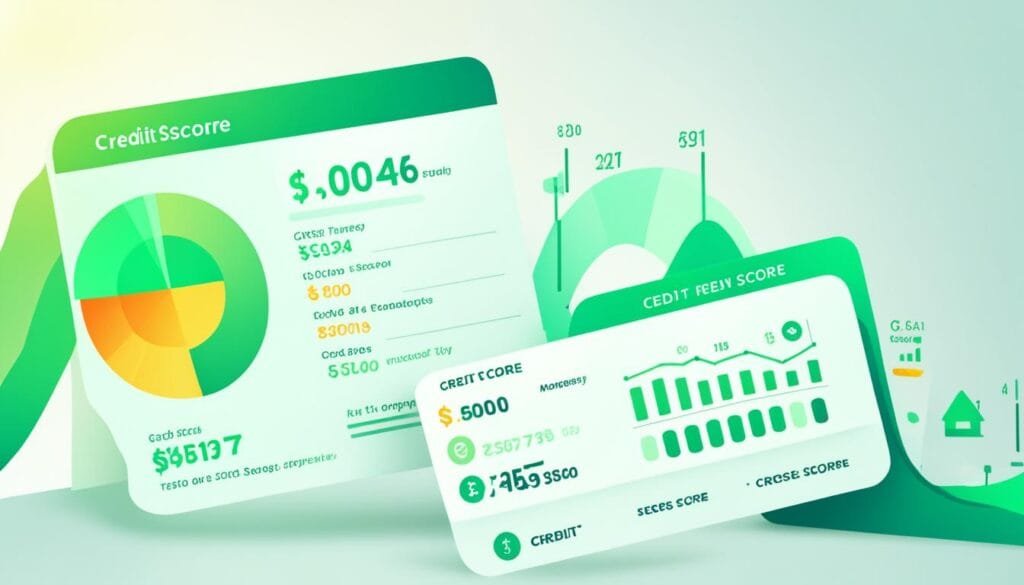In today’s competitive job market, employers are not only interested in your qualifications and experience but also in your credit score. That’s right, your credit score can have an impact on your job prospects and opportunities. In this article, we will explore the correlation between credit score and employment and why employers conduct credit checks during the hiring process.
According to a 2018 HR.com report sponsored by the National Association of Background Screeners (NABS), 95% of companies conduct some type of background check on potential employees, with 16% of them pulling credit or financial checks on all job candidates. While employers cannot see your credit score, they have access to your credit report, which includes information about credit history, outstanding balances, late or missed payments, bankruptcies, and collection accounts. Employers often use credit checks for positions involving financial responsibilities or handling money. It is important for job seekers to be aware of their credit history and be able to explain any negative entries.
Key Takeaways:
- A credit check is a common practice conducted by employers during the hiring process.
- Your credit report provides information about your credit history, outstanding balances, and payment history.
- Job seekers should be proactive in reviewing their credit report and addressing any negative entries.
- Certain positions, especially those involving financial responsibilities, may require a satisfactory credit history.
- A good credit score can enhance job prospects and open doors to better opportunities.
The Difference Between Credit Report and Credit Score
When it comes to assessing your financial health, understanding the difference between your credit report and credit score is essential. While both provide insights into your creditworthiness, they serve different purposes and provide distinct information to lenders and employers.
Your credit report provides a detailed history of your credit accounts, balances, available credit, and payment history. It is a comprehensive record of your past and current credit activities. By examining your credit report, lenders and employers can assess your creditworthiness and make informed decisions. On the other hand, your credit score is a three-digit number that summarizes the information in your credit report.
Think of your credit score as a snapshot of your creditworthiness at a specific point in time. It condenses the information in your credit report into a single number, making it easier for lenders and employers to evaluate your creditworthiness quickly and efficiently.
A higher credit score indicates a lower risk for lenders and employers, as it suggests that you have a history of responsible credit management. Conversely, a lower credit score suggests a higher risk, indicating that you may have had issues with managing your credit obligations in the past.
Here’s a visual representation of the difference between a credit report and a credit score:
| Credit Report | Credit Score |
|---|---|
| Provides a detailed history of credit accounts, balances, available credit, and payment history. | Summarizes the information in the credit report into a three-digit number. |
| Considered a comprehensive record of past and current credit activities. | Acts as a snapshot of creditworthiness at a specific point in time. |
| Used by lenders and employers to assess creditworthiness. | Used by lenders and employers to quickly evaluate creditworthiness. |
Understanding the difference between your credit report and credit score is crucial for managing your financial health. While your credit report provides a comprehensive overview of your credit history, your credit score acts as a convenient summary that lenders and employers use to assess your creditworthiness. By staying informed about both your credit report and credit score, you can make better financial decisions and work towards improving your creditworthiness.
Why Do Employers Check Credit?
Employers conduct credit checks to protect their business, employees, and customers. A credit check serves as a valuable tool for employers to assess the financial responsibility and risk level of potential employees. Let’s explore the reasons why employers utilize credit checks in the hiring process and how it contributes to the overall risk assessment.
Verification of Identity and Background
An employer credit check provides an additional layer of verification for a candidate’s identity, educational background, and previous employment. By reviewing the credit report, employers can cross-reference the provided information with the applicant’s credit history, ensuring accuracy and authenticity.
Insights into Financial Responsibility
Furthermore, credit checks offer insights into how a potential employee manages their financial responsibilities. Employers can evaluate an applicant’s financial track record, including their ability to handle credit, outstanding balances, and payment history. A candidate with a strong credit history signals responsible financial behavior, which can be advantageous, especially for positions involving financial decision-making or handling money.
Identification of Financial Distress
Credit checks also help employers identify whether a potential employee may be in financial distress. Instances of bankruptcies, collection accounts, or late payments may indicate financial instability or poor financial management. These red flags allow employers to assess the risk associated with hiring an individual who may be more susceptible to fraudulent behavior or financial trouble.
“Employers conduct credit checks to gain insights into a potential employee’s financial responsibility and risk level, which can be particularly relevant for positions involving money management or financial decision-making.”
Overall, employer credit checks aim to minimize potential risks and protect the interests of the business, employees, and customers. By evaluating an applicant’s credit history, employers can make informed decisions and mitigate potential financial and security risks.
| Reasons for Employer Credit Checks | Benefits |
|---|---|
| Verification of identity and background | Ensures accurate applicant information |
| Insights into financial responsibility | Assesses candidate’s ability to handle financial responsibilities |
| Identification of financial distress | Helps identify potential risks and fraud susceptibility |
Legal Rights and Employer Credit Checks
When it comes to employer credit checks, job applicants have certain legal rights and protections under the Fair Credit Reporting Act (FCRA). The FCRA establishes guidelines that employers must follow when conducting credit checks on potential employees, ensuring fairness and transparency in the hiring process.
First and foremost, employers are required to obtain written consent from job applicants before conducting a credit check. This consent must be separate from the general job application and clearly indicate the intention to review the applicant’s credit report.
Additionally, applicants have the right to receive a copy of the credit report used in the employment decision. This allows individuals to review the information that may have influenced the hiring process. If there are any inaccuracies or discrepancies in the report, applicants also have the opportunity to dispute them and provide additional information to correct any errors.
It’s important to note that while the FCRA sets federal guidelines for employer credit checks, some states have additional restrictions or regulations in place. These state-specific laws may further limit the use of credit checks for employment purposes, providing even more protection for job seekers. Therefore, it’s crucial for applicants to be familiar with their state’s laws regarding employer credit checks.
By safeguarding the legal rights of job applicants, the FCRA ensures that credit checks are conducted in a fair and responsible manner. This helps prevent any potential misuse or discrimination based on an individual’s credit history, promoting equal opportunities for employment.

Key Points:
- The Fair Credit Reporting Act (FCRA) sets guidelines for employer credit checks.
- Employers must obtain written consent from job applicants before conducting a credit check.
- Applicants have the right to receive a copy of the credit report used in the employment decision.
- Opportunity to dispute any inaccuracies in the credit report.
- Some states have additional restrictions on the use of credit checks for employment.
How to Prepare for an Employer Credit Check
Preparing for an employer credit check is essential for job seekers who want to present themselves in the best light. By taking proactive steps to review their credit report and address any errors or negative entries, candidates can strengthen their financial profile. Here are some key strategies to help you prepare:
- Review your credit report: Obtain a free credit report from each of the major credit bureaus annually. This will allow you to see your credit history in detail and ensure its accuracy. Look for any discrepancies or incorrect information that may affect your credit score.
- Address errors or negative entries: If you find any errors or negative entries in your credit report, take immediate action to rectify them. Contact the credit bureau and provide any necessary documentation to support your dispute. It’s important to resolve these issues before potential employers review your credit history.
- Improve your credit health: Taking steps to improve your credit health can significantly enhance your financial profile. Make an effort to pay your bills on time and reduce any outstanding debt. This demonstrates responsible financial behavior and positively influences employers’ perception of your financial responsibility.
Remember, an employer credit check is not the only factor considered in the hiring process. However, by being proactive in reviewing your credit report and improving your credit health, you can present yourself as a strong candidate for job opportunities. An accurate and positive credit history can pave the way to better job prospects.

“Preparing for an employer credit check is an integral part of the job search process. Job seekers who take the time to review their credit report and address any errors or negative entries can position themselves as responsible and reliable candidates. It’s essential to be proactive and showcase your financial responsibility to potential employers.” – Financial Advisor, Jane Thompson
How Does a Low Credit Score Affect Job Prospects?
A low credit score can greatly impact job prospects. Many employers check the credit score of potential employees to gauge their responsibility and reliability. A low score may indicate financial instability, leading to concerns about managing company finances. It can also affect job seekers in industries like finance and government.
Conclusion
After discussing the impact of credit score and employment on job prospects, it is clear that while an employer credit check can play a role in the hiring process, it is just one factor among many. Job seekers should not solely focus on their credit score but should also be proactive in understanding their credit history and taking steps to improve their overall credit health.
By demonstrating responsible financial behavior and being transparent about any challenges they may have faced, candidates can present themselves as strong contenders for employment opportunities. It is important for job seekers to remember that a good credit score can enhance their job prospects and open doors to better job opportunities.
Therefore, it is advisable for individuals to review their credit report, address any errors or negative entries, and work towards improving their credit health. By doing so, job seekers can showcase their financial responsibility and increase their chances of securing their desired positions.
In conclusion, while a credit check may be a part of the hiring process, job seekers should not be overly concerned. By taking control of their credit score and being proactive in addressing any issues, individuals can position themselves as strong candidates and maximize their job opportunities.
FAQ
What information do employers see in a credit check?
Employers have access to your credit report, which includes information about credit history, outstanding balances, late or missed payments, bankruptcies, and collection accounts.
Why do employers conduct credit checks on job candidates?
Employers conduct credit checks to assess a candidate’s financial responsibility, especially for positions involving financial responsibilities or handling money.
Can an employer see my credit score?
Employers cannot see your credit score directly, but they can see your credit report, which helps them assess your creditworthiness.
How can job seekers prepare for an employer credit check?
Job seekers can review their credit report, address any errors or negative entries, and take steps to improve their credit health, such as paying bills on time and reducing debt.
What are my legal rights when it comes to employer credit checks?
The Fair Credit Reporting Act (FCRA) sets guidelines for employer credit checks. Employers must obtain written consent, provide notice of their intention to review credit reports, and offer applicants the opportunity to dispute any inaccuracies.
How much does a credit check impact my job prospects?
While an employer credit check is just one factor among many considered in the hiring process, it can impact job prospects, especially for positions involving financial responsibilities or handling money.

